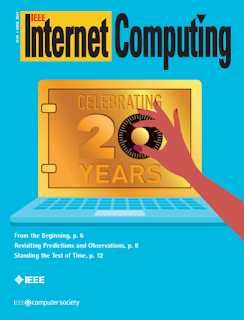On its 20th anniversary, the editorial board created its first ever “The Test of Time” award. I'm honored to say they gave it to our 2003 article, "Amazon.com Recommendations: Item-to-Item Collaborative Filtering", which continues to be accessed, cited, and used in industry and research many years after its original publication.
In addition, for the 20th anniversary issue of IEEE Internet Computing, we wrote a new article, “Two Decades of Recommender Systems at Amazon.com". Some excerpts:
For two decades now, Amazon.com has been building a store for every customer. Each person who comes to Amazon.com sees it differently ... It's as if you walked into a store and the shelves started rearranging themselves, with what you might want moving to the front, and what you're unlikely to be interested in shuffling further away.
Amazon.com launched item-based collaborative filtering in 1998, enabling recommendations at a previously unseen scale for millions of customers and a catalog of millions of items. Since we wrote about the algorithm in IEEE Internet Computing in 2003, it has seen widespread use across the Web, including YouTube, Netflix, and many others.
The algorithm's success has been from its simplicity, scalability, and often surprising and useful recommendations, as well as desirable properties such as updating immediately based on new information about a customer and being able to explain why it recommended something in a way that's easily understandable.
What was described in our 2003 IEEE Internet Computing article has faced many challenges and seen much development over the years ... We describe some of the updates, improvements, and adaptations for item-based collaborative filtering, and offer our view on what the future holds for collaborative filtering, recommender systems, and personalization.
....
What does the future hold for recommendations? ... Discovery should be like talking with a friend who knows you, knows what you like, works with you at every step, and anticipates your needs.
Recommendations and personalization live in the sea of data we all create as we move through the world, including what we find, what we discover, and what we love ... Intelligent computer algorithms leveraging collective human intelligence ... Computers helping people help other people.
The field remains wide open. An experience for every customer ... offering surprise and delight ... is a vision none have fully realized. Much opportunity remains to add intelligence and personalization to every part of every system, creating experiences that seem like a friend that knows you, what you like, and what others like, and understands what options are out there for you.
